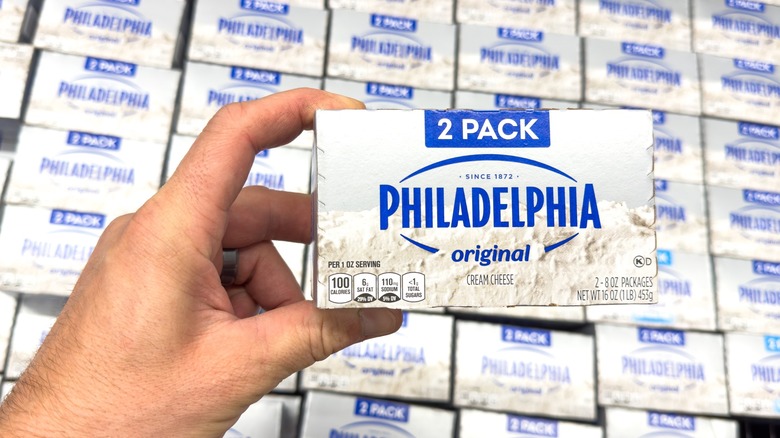Can You Freeze A Whole Block Of Cream Cheese?
A fully stocked kitchen is one of life's happiest little luxuries. The ability to whip up things like bacon-flavored compound cream cheese, crab dip, cream cheese pie or cheesecake, and any kind of frosting you can dream of without having to run to the market or shell out for delivery is worth even more than service fee savings. And cream cheese, which happens to factor into all of those recipes, is even easier to add to your home-cooking arsenal than it might first appear.
Dairy expiration dates are always top of mind. The countdown begins as soon as you've got it in your grocery cart and continues haunting your refrigerator shelves until you use it up or, in the worst case scenario, relegate it to the wastebasket. The deadline printed on your cream cheese seems far away compared to your milk, but it isn't going to last forever. And all bets are off once you open it. How long cream cheese lasts after opening varies, but it's not more than a couple of weeks. But you can freeze cream cheese for around two months.
But the cream cheese that goes into the freezer is going to be a bit different from the cream cheese that comes out. The most common complaint about frozen cream cheese is its texture. It becomes a bit crumbly or gritty upon thawing, though it's less so in options that have less fat to separate. But be prepared to obscure it in preparations that don't require a smooth texture.
How to freeze cream cheese
Exposing cream cheese to air is what shortens its shelf life. That means freezing is most useful in instances when that expiration date is creeping ever closer and you haven't even opened the box. In that case, you can simply freeze the whole package as is (the foil wrapper will protect it from freezer burn). Write the freeze date near the actual expiration date so you know how long it's been in the freezer. Placing the whole container in a resealable freezer bag doesn't hurt, but resist the urge to open the box and portion it out. It lasts longer in its original container.
Things get marginally more complicated if you've got a block you've already cut into. You still want to keep it intact; any slicing just creates more surface areas for air exposure, which is exactly what you don't want. Instead, break out that vacuum sealer or just give it a tight twirl in cling wrap. Cream cheese's unopened refrigerator life mirrors its maximum freezer stability (around two months). After that, the texture degrades quickly.
You can thaw frozen cream cheese in the refrigerator overnight or blast it for a few seconds in the microwave (sans the metal wrapper). Depending on how long it's been in the freezer and how much fat the cream cheese contains, there will be some graininess (potentially even downright crumbliness), but it can still get the job done in recipes where cream cheese plays a supporting role, especially cooked recipes that give you the chance to stir and re-emulsify the mixture.

